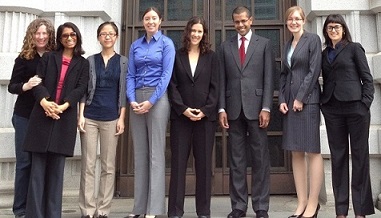Help Defend Asylum
CGRS relies on the generous support of people like you to sustain our advocacy defending the human rights of refugees. Make a gift today!

The U.S. Court of Appeals for the Ninth Circuit en banc ruled that the Board of Immigration Appeals misapplied its own precedent on the particular social group ground in denying asylum to a 12-year-old girl from Salvador who testifed against gang members who murded her father.
CGRS Involvement
CGRS filed an amicus brief to the en banc panel of the Ninth Circuit and was granted time at oral argument. Seasoned litigator Kannon Shanmugan of Williams & Connolly argued for CGRS. Watch a video of the argument here. Ms. Henriquez-Rivas is represented by Saad Ahmad.
Basic Facts
At the age of 12, Ms. Henriquez-Rivas witnessed her father’s murder by members of a criminal gang in El Salvador. She testified in open court against the gang members, and they were convicted based on her testimony. One of the men later escaped from prison, and he was reported to be looking for her. Ms. Henriquez-Rivas came to the United States because she believed her life was in grave danger from the gang members she testified against and that the Salvadoran government would not protect her.
Procedural History
The Immigration Judge (IJ) granted asylum, finding Ms. Henriquez-Rivas’s testimony credible, her fear of persecution well-founded, and that this persecution was on account of her membership in a social group of individuals who had testified against gang members in El Salvador. The Department of Homeland Security (DHS) appealed this decision to the BIA, arguing that individuals who have testified against gang members in El Salvador does not constitute a particular social group eligible for asylum under the law. The BIA reversed the IJ’s decision on that basis, but did not disturb the IJ’s other findings, including the judge’s finding that, if returned to El Salvador, gang members will most likely kill Ms. Henriquez-Rivas and the Salvadoran government is unwilling and unable to control criminal gang violence.
Ms. Henriquez-Rivas appealed the BIA’s decision to the Ninth Circuit. In an unpublished decision, the Court denied her appeal, finding that her claim was foreclosed by prior precedent rejecting social groups comprised of government informants and witnesses. Henriquez-Rivas v. Holder, 449 F. App’x 626 (9th Cir. 2011). The Court thereafter granted Ms. Henriquez-Rivas’s petition for rehearing of the case en banc and heard oral argument in February 2012. CGRS filed a brief on behalf of several public interest law organizations and law school clinics and clinicians arguing that the BIA’s interpretation of the immigration statute is unworthy of the Court’s deference. CGRS also coordinated the filing of five amicus briefs, including one from the United Nations High Commissioner for Refugees. The Court granted CGRS time for oral argument, and we collaborated with Kannon Shanmugam of the Washington, DC law firm of Williams & Connolly who presented oral argument on our behalf. The en banc court vacated the BIA decision and sent the case back to the BIA with clear guidance as to the legal standards for “particular social group” claims and how they should be applied in this case. In addition to the success for Rocio, the legal victory casts a wider net of protection for women, children, and LGBT asylum seekers, as well as for others fleeing violence at the hands of private actors, such as criminal gangs.
Legal Documents
CGRS amicus Brief (February 21, 2012)
NIJC amicus brief (February 21, 2012)
Additional Documents Forthcoming
Request Assistance in Your Case
For more information about this case, or to request other assistance from CGRS in your case, please fill out this form.
 Get help
Get help Log In
Log In




